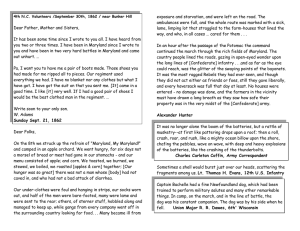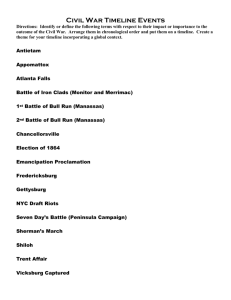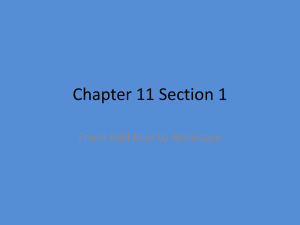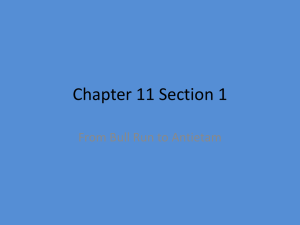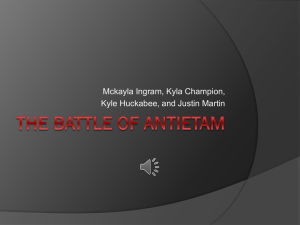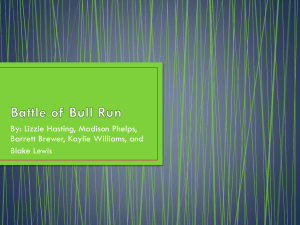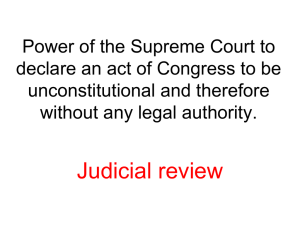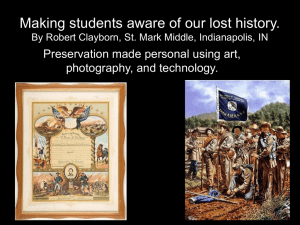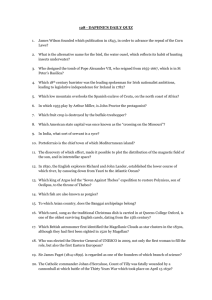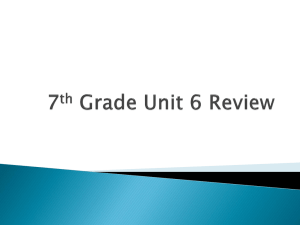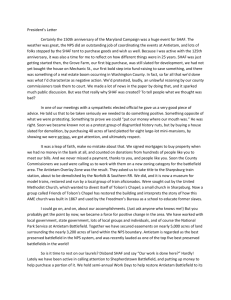Questions
advertisement
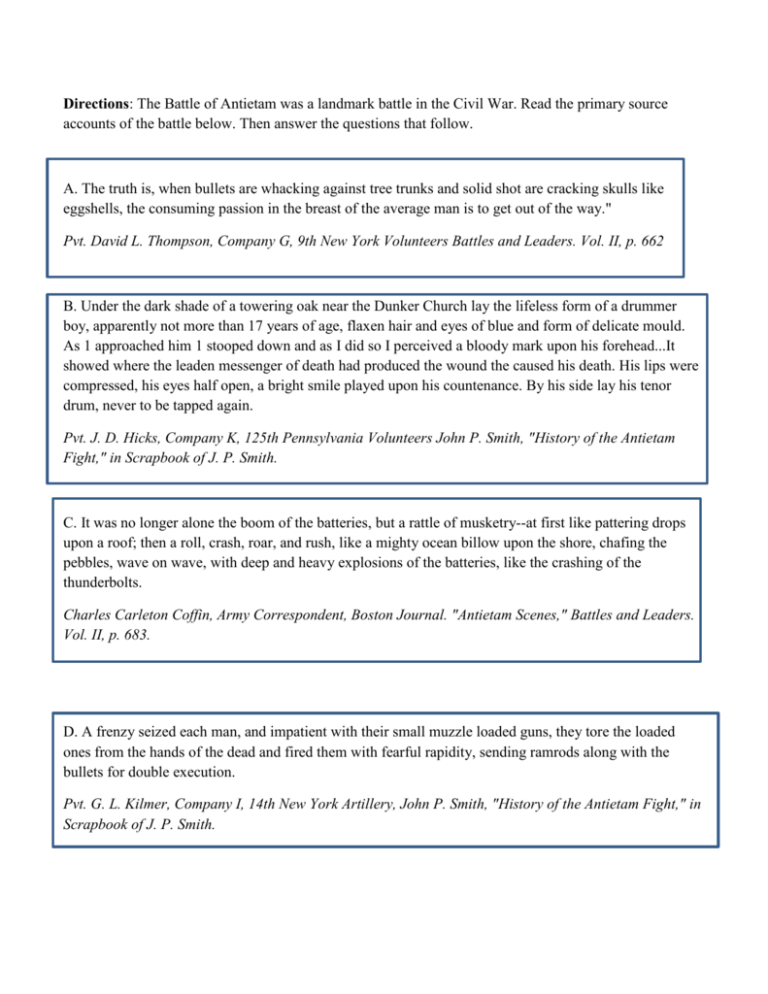
Directions: The Battle of Antietam was a landmark battle in the Civil War. Read the primary source accounts of the battle below. Then answer the questions that follow. A. The truth is, when bullets are whacking against tree trunks and solid shot are cracking skulls like eggshells, the consuming passion in the breast of the average man is to get out of the way." Pvt. David L. Thompson, Company G, 9th New York Volunteers Battles and Leaders. Vol. II, p. 662 B. Under the dark shade of a towering oak near the Dunker Church lay the lifeless form of a drummer boy, apparently not more than 17 years of age, flaxen hair and eyes of blue and form of delicate mould. As 1 approached him 1 stooped down and as I did so I perceived a bloody mark upon his forehead...It showed where the leaden messenger of death had produced the wound the caused his death. His lips were compressed, his eyes half open, a bright smile played upon his countenance. By his side lay his tenor drum, never to be tapped again. Pvt. J. D. Hicks, Company K, 125th Pennsylvania Volunteers John P. Smith, "History of the Antietam Fight," in Scrapbook of J. P. Smith. C. It was no longer alone the boom of the batteries, but a rattle of musketry--at first like pattering drops upon a roof; then a roll, crash, roar, and rush, like a mighty ocean billow upon the shore, chafing the pebbles, wave on wave, with deep and heavy explosions of the batteries, like the crashing of the thunderbolts. Charles Carleton Coffin, Army Correspondent, Boston Journal. "Antietam Scenes," Battles and Leaders. Vol. II, p. 683. D. A frenzy seized each man, and impatient with their small muzzle loaded guns, they tore the loaded ones from the hands of the dead and fired them with fearful rapidity, sending ramrods along with the bullets for double execution. Pvt. G. L. Kilmer, Company I, 14th New York Artillery, John P. Smith, "History of the Antietam Fight," in Scrapbook of J. P. Smith. E. At the Battle of Antietam, as one of the regiments was for the second time going into the conflict, a soldier staggered. It was from no wound, but in the group of dying and dead through which they were passing, he saw his father, of another regiment, lying dead. A wounded man, who knew them both, pointed to the father's corpse, and then upwards, saying only, 'It is all right with him.' Onward went the son, by his father's corpse, to do his duly in the line, which, with bayonets fixed, advanced upon the enemy. When the battle was over, he came back. and with other help. buried his father. From his person he took the only thing he had. a Bible, given to the father years before, when he was an apprentice. Account from an unknown soldier F. September 26, 1862 (In a hospital near the Battlefield of Antietam) Dear Wife, Thinking perhaps that you would like to hear from me. I now have a few moments in writing to you to let you know of an accident which happened to me on the evening of the 18th. One of the 135 P.V. boys accidentally shot me through the back. The ball passed through my lungs and lodged somewhere and is in me yet. I suffered considerable pain for the few first days but now I am more comfortable now and am not in much pain. Our brigade did not get along from Washington soon enough to be engaged in the Battle of the day before. There was a hard fought battle and many lives lost on both sides but I think the loss of the Rebels were more than double our loss. I hope that you will not grow uneasy about me for I am doing as well as can be and have good care for brother William is with me taking care of me and as soon as I get well enough I am coming home and to be with you again, I do not want you to write until you hear from me again for a letter would not come through. I am now 10 miles from Middletown, MD and as soon as we get moved I will write to you to let you know where we are moved to. As I do not think of anything more that will interest you I will bring this letter to a close and write to you again in a few days. From your affectionate and loving husband, Erred Fowles (Erred Fowles died on October 6, 1862. He is buried in Grave #3724 in the cemetery at Antietam. His daughter, Ida May Fowles, was born October 10, 1862.) G. "In the time that I am writing every stalk of corn in the northern and greater part of the field was cut as closely as could have been done with a knife, and the slain lay in rows precisely as they had stood in their ranks a few moments before. It was never my fortune to witness a more bloody, dismal battlefield." Gen. Joseph Hooker, Official Records (US War Dept), Series 1, Vol. 19, Pt 1, p.218. H. 4th N.C. Volunteers September 30th, 1862 Camp near Bunker Hill Dear Father, Mother and Sisters, It has been some time since I wrote to you all. I have heard from you two or three times. I have been in Maryland since I wrote to you and have been in two very hard battles in Maryland and came out unhurt. I see a great deal and could tell you more than I write if I could see you. Our regiment did not have many wounded nor killed but a good many taken prisoners. Frank Shepherd and John Fennster we suppose are taken. We have not heard from them since the fight. They were not in the fight; were left at the camp. The Yankees took them. On their escape they took a good many of our negroes. That was a great victory at Harper's Ferry. I would like to have been in that. Our men did not fire a gun. They burn the Yankees to death and they give up everything and raised a white flag and attack their army. The men say that they saw it and was the best thing they ever saw. The seventh regiment N.C. was there and saw it all. E. Morrison Scroggs was telling me about how they done. He saw it all. I would like to have been there. Our regiment used everything we had. I have no blanket nor any clothes but what I have got. I have got the suit on that you sent me. They came in a good time. I like them very well. If I had a good pair of shoes I would be the best clothed man in the regiment. Pa, I want you to have me a pair of boots made. Those shoes you had made for me ripped all to pieces. Our regiment used everything we had. I have no blanket nor any clothes but what I have got. I have got the suit on that you sent me. They came in a good time. I like them very well. If I had a good pair of shoes I would be the best clothed man in the regiment. Cousin Dr. Hill is wounded in the knee very bad. I have nothing more for my paper is scarce. Write soon to your only son. W. Adams I. Comrades with wounds of all conceivable shapes were brought in and placed side by side as thick as they could lay, and the bloody work of amputation commenced. George Allen, Company A, 6th New York Volunteers, From "Scenes in the Hospital at Keedysville," The Antietam Wavalet. Keedysville, Maryland, March 29, 1890. J. William Child, Major and Surgeon with the 5th Regiment New Hampshire Volunteers September 22, 1862 (Battlefield Hospital near Sharpsburg) My Dear Wife; Day before yesterday I dressed the wounds of 64 different men - some having two or three each. Yesterday I was at work from daylight till dark - today I am completely exhausted - but stall soon be able to go at it again. The days after the battle are a thousand times worse than the day of the battle – and the physical pain is not the greatest pain suffered. How awful it is - you have not can have until you see it any idea of affairs after a battle. The dead appear sickening but they suffer no pain. But the poor wounded mutilated soldiers that yet have life and sensation make a most horrid picture. I pray God may stop such infernal work through perhaps he has sent it upon us for our sins. Great indeed must have been our sins if such is our punishment. Our Reg. Started this morning for Harpers Ferry - 14 miles. I am detailed with others to remain here until the wounded are removed - then join the Reg. With my nurses. I expect there will be another great fight at Harpers Ferry. Carrie I dreamed of home night before last. I love to dream of home it seems so much like really being there. I dreamed that I was passing Hibbards house and saw you and Lud. in the window. After then I saw you in some place I cannot really know where -you kissed me - and told me you loved me - though you did not the first time you saw me. Was not that quite a soldier dream? That night had been away to a hospital to see some wounded men - returned late. I fastened my horse to a peach tree - fed him with wheat and hay from a barn near by - then I slept and dreamed of my loved ones away in N.H. Write soon as you can. Tell me all you can about my business affairs and prospects for the future in Bath. Will Dr. Boynton be likely to get a strong hold there. One thing sure Cad, I shall return to Bath - if I live - and spend my days there. I feel so in that way now. Give me all news you can. Tell Parker and John and the girls to write although I can not answer them all. Tell Parker I will answer his as soon as I can. In this letter I send you a bit of gold lace such as the rebel officers have. This I cut from a rebel officers coat on the battlefield. He was a Lieut. I have made the acquaintance of two rebel officers - prisoners in our hands. One is a physician - both are masons - both very intelligent, gentlemanly men. Each is wounded in the leg. They are great favorites with our officers. One of them was brought off the field in hottest of the fight by our 5th N.H. officers - he giving them evidence of his being a mason. Now do write soon. Kisses to you Clint & Kate. Love to all. Yours as ever, W.C. Questions 1. Describe the Battle of Antietam. a. Who? b. What? (Include the outcome) c. When? d. Where? 2. Describe the tone(s) of the accounts you have read. 3. Compare the Union and Confederate accounts of the battle. What do they have in common? 4. Regarding Antietam, your textbook states, “The clash [at Antietam] proved to be the bloodiest single-day battle in American history. Casualties totaled more than 26,000, as many as in the War of 1812 and the war with Mexico combined…Though the battle itself was a standoff, the South, which had lost a quarter of its men, retreated the next day across the Potomac into Virginia.” What, if anything, is missing from this description of the battle?
